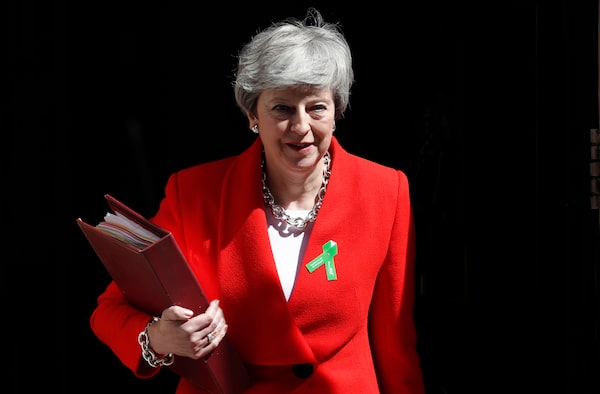
British Prime Minister Theresa May announced that members of Parliament will vote on a bill to adopt the EU withdrawal agreement during the week of June 3.Alastair Grant/The Associated Press
British Prime Minister Theresa May will try for a fourth time to get her Brexit deal with the European Union approved by Parliament despite mounting opposition to the agreement and increased calls for her to resign.
Ms. May has announced that members of Parliament will vote on a bill to adopt the EU withdrawal agreement during the week of June 3. The agreement has been rejected by MPs three times, but Ms. May is hoping that ongoing talks with the opposition Labour Party might help break the impasse. She’s also trying to ease the Brexit turmoil which has taken a toll on the economy and is now threatening the future of British Steel, the country’s second-largest steel maker.
"This is a government that wants to deliver Brexit and has been working to deliver Brexit,” she told the House of Commons on Wednesday. “Sadly, so far the House of Commons has not found a majority to do that.”
It’s far from certain that Ms. May’s fourth try will be any more successful. Talks with Labour Leader Jeremy Corbyn have gone nowhere and the opposition has signalled that it won’t back the withdrawal bill. A group of Ms. May’s fellow Conservative MPs has also come out against the bill along with Northern Ireland’s Democratic Unionist Party (DUP), whose 10 MPs prop up Ms. May’s minority government.
The sticking point for many MPs remains the Irish backstop, a provision in the agreement that keeps Northern Ireland largely within EU regulations to avoid a hard border with Ireland. Opponents have argued the backstop ties Britain to the EU indefinitely and defeats the purpose of Brexit. “Unless [Ms. May] can demonstrate something new that addresses the problem of the backstop, then it is highly likely her deal will go down to defeat once again,” DUP MP Nigel Dodds said in a statement Wednesday. Added Tory MP Peter Bone: “I have talked to colleagues, some of whom voted for it last time, and they think it is dead and they will vote against it this time. It seems absurd to bring it back. It is the same thing again, again and again.”
Ms. May’s political future is on the line as well. Several Tory MPs and hundreds of party members across the country have demanded she resign this summer. Ms. May has said that she was prepared to step down once Parliament approved the Brexit deal, but many Tories have been pressing her to set a departure date. The uncertainty surrounding Brexit has been weighing heavily on Conservative support and the party suffered a crushing defeat in recent local elections, losing more than 1,000 seats. The Tories are also expected to do poorly in elections for the European Parliament on May 23, with some opinion polls showing Tory support at just 12 per cent.
Theresa May’s party slumps to fifth place in opinion poll as pressure mounts for her to step down
The European elections: Why they matter in the age of populism
The move to push her out has also complicated talks with Mr. Corbyn, who has expressed concern that a future Tory leader, particularly former foreign secretary Boris Johnson, could renege on any Brexit agreement he struck with Ms. May. Mr. Corbyn has been pushing for the U.K. to remain in the EU’s customs union, which allows for the free movement of goods among member states. Ms. May hasn’t ruled out some kind of customs union with the EU but Mr. Johnson has fiercely opposed the idea, arguing that it would prevent the country from conducting its own trade policy because member states must apply the same external tariffs.
Britain is due to leave the EU on Oct. 31 of this year, but Ms. May wants the withdrawal agreement passed by July to ensure the country leaves before the European Parliament begins its new session. That now seems doubtful and it’s almost certain that Britain’s MEPs will take their seats for at least a few months.
The Brexit deadlock has also thrown a cloud over the future of British Steel, which employs 4,500 people. The company said this week that it needs a loan from the government of up to £75-million ($129-million) to cope with “Brexit-related issues.” Roughly 70 per cent of British Steel’s products are exported to buyers across Europe and Turkey, and many of those customers have cut back on purchases. "The uncertainties around Brexit are posing challenges for all businesses including British Steel, and we are holding constructive discussions with our stakeholders on how to navigate them,” the company said in a statement. The request for help comes just days after the government lent British Steel £120-million to cover its obligations under EU law for carbon emissions.
The steel maker nearly collapsed in 2016, but it was bought from India’s Tata Steel by London-based Greybull Capital for £1. Greybull rebranded the business British Steel, taking the name from the old nationalized business, and promised to invest £400-million as part of a turnaround plan.
 Paul Waldie
Paul Waldie